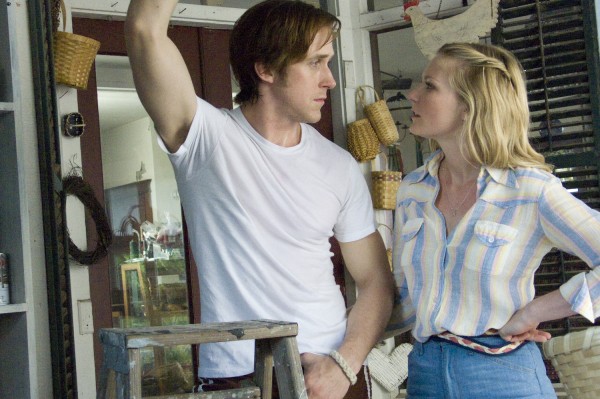Murder in Texas?
… or maybe New York … or maybe not at all. Cross-dressing Durst case gets muddled, fictionalized investigation in the unfocused ‘All Good Things’
ARNOLD WAYNE JONES | Life+Style Editor
jones@dallasvoice.com
Quick, name the artsy Ryan Gosling movie out now about a troubled man and his complex sexual relationship with a blonde — and they have sex in a shower. Yeah, maybe you said Blue Valentine, but you could have said All Good Things. Gosling’s character here trades up the social ladder but down the well-adjusted scale with AGT, inspired by the life of Texas-based killer (and sometime cross-dresser) Robert Durst.
 Gosling plays the Durst character, here called David Marks, the scion of an abrasive, wealthy New York slumlord (Frank Langella). David reluctantly enters the family business once he meets Katie (Kirsten Dunst), basically serving as bag-man for his dad’s collections arm. Dad is disapproving of him, and looks disdainfully on Katie, which only exacerbates David’s isolation, as well as his spiraling psychological instability.
Gosling plays the Durst character, here called David Marks, the scion of an abrasive, wealthy New York slumlord (Frank Langella). David reluctantly enters the family business once he meets Katie (Kirsten Dunst), basically serving as bag-man for his dad’s collections arm. Dad is disapproving of him, and looks disdainfully on Katie, which only exacerbates David’s isolation, as well as his spiraling psychological instability.
Their turbulent relationship ends with Katie’s disappearance (her body is never found) and Marks himself goes into hiding, living as a woman in Galveston.
A sizeable problem with All Good Things is that it can’t seem to decide whether it is A Beautiful Mind (i.e., a portrait of mental illness and its tragic consequences) or Sleeping with the Enemy (a woman trapped in a marriage to a psychotic).
If the latter, director Andrew Jarecki should have watched more Hitchcock before undertaking this, his first narrative feature. Despite some violent outbursts, there’s no sense of menace about David. He’s disturbingly off, yes, and there are overt indications of his fury (he kills a dog), but Jarecki handles these scenes dispassionately, with a documentarian’s observational detachment. The stakes simply don’t seem all that substantial.
At its heart, this is a mystery that’s unknowable, not unlike Jarecki’s Oscar-nominated documentary Capturing the Friedmans. It should be moody and enigmatic, but actually tries to explain too much. Eventually, it edges in the direction of Sleeping with the Enemy territory, and the style morphs from portrait to potboiler. By the time David turns up living as a woman, it seems more comical than creepy.
Credit Gosling with tackling the role of David, who’s inscrutable but also pretty dull, with conviction if not passion. In his old lady clothes, he looks like a slightly more animated version of Norman Bates’ mother. Dunst, Langella and Philip Baker Hall (as David’s crabby neighbor) deliver uninteresting performances of two-dimensional characters.
The true story of Durst, as reported in the media, is more bizarre than the movie can do justice to, and the armchair psychologizing (including a posited theory that seeks to say what really happened) feels forced, and the ending is unsatisfying. There’s a great movie in his story somewhere; too bad this one isn’t it. It just cannot compete with reality.
This article appeared in the Dallas Voice print edition Jan. 21, 2011.
















